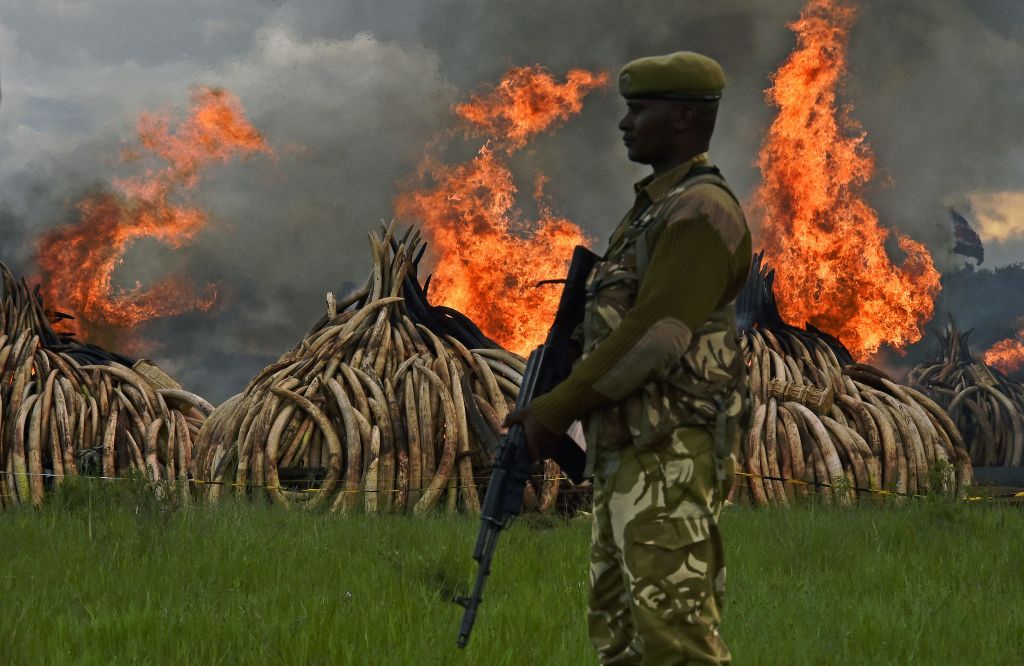ADF STAFF
The slaying of South African park ranger Anton Mzimba, who was gunned down while working on his car outside his home on July 26, shocked and saddened the nation.
Mzimba, 49, was the head ranger at Timbavati Private Nature Reserve in Mpumalanga. The 534-square-kilometer protected area is home to rhinoceroses, elephants, lions, cheetahs and leopards.
“Intelligence-driven information revealed that there had been numerous threats against his life and that his murder was in retaliation for refusing to provide the local rhino poaching syndicate with the exact locations of rhino,” the Wild Heart Wildlife Foundation said in a statement.
On a continent known for its vast nature reserves, ecotourism and approach to conservation, armed poachers and militant groups are targeting park rangers.
The murder of a highly decorated field ranger of 24 years underscores the danger of standing up to poachers, wildlife traffickers and organized criminal groups.
Since 2011, 565 have died in the line of duty, more than half of which were homicides. A record 92 rangers died in 2021, 46 by homicide.
In another high-profile case in 2021, senior Kenya Wildlife Service officer Bajila Obed Kofa was shot and killed in his car after taking his daughter to school. In 2020, Lt. Col. Leroy Bruwer, a South African police detective who specialized in investigating rhino poaching syndicates, was fatally shot while driving to work.
Chief executive of the Game Rangers’ Association of Africa Andrew Campbell called Mzimba’s death “an escalation from the norm” and said he likely was targeted because of his high profile in the wildlife security and conservation community.
“Now these syndicates feel comfortable literally coming in and doing mob-style hits,” Campbell told The New York Times.
About 150 rangers worldwide die each year protecting wildlife and habitat, according to the Thin Green Line (TGL) Foundation, an international charity that supports rangers and the families of those who are killed.
Conflicts with poachers are responsible for 50% to 70% of ranger deaths on the job, according to data TGL has been compiling for the past 10 years. The rest are attributed to daily challenges, such as hazardous environments and dangerous animals.
In Africa, 82% of rangers said they had faced a life-threatening situation in the line of duty, according to surveys conducted in 2016 by the World Wildlife Fund (WWF), one of the world’s largest conservation groups.
WWF says rangers and poachers often come from the same communities.
In the only extensive surveys ever to examine rangers’ work conditions, the WWF interviewed 570 African rangers and found that 75% said members of their local communities had threatened them over their work.
Francis Massé, a postdoctoral researcher at the University of Sheffield, lived with and studied Mozambique’s anti-poaching forces for five months for his Ph.D.
He saw many of the rangers deal with threats and attacks.
“I’ve seen guys receive death threats and they don’t know how to deal with it,” he told Mongabay conservation news website. “They don’t know if these guys who are threatening them also know where their family lives in the city.
“[Poachers] get arrested and in two weeks they are back out in the communities right outside the park where the rangers have to pass in and out.”
The work exacts a heavy toll on rangers, most of whom complain of stress from harsh working conditions, and insufficient training and equipment. Many feel isolated and ostracized from their communities.
“The pressure is relentless, there is no respite,” Elise Serfontein, founding director of Stop Rhino Poaching, told Mongabay. “The physical and mental fatigue is taking its toll.”
In the past decade, the markets for illegal rhino horn and ivory have surged globally.
For rangers, already dangerous work has intensified as their adversaries have become better financed and better armed.
In a security sector that increasingly has become militarized, the United States has worked directly with several parks services in countries such as Chad, Gabon, Tanzania and Uganda.
Sam Mwandha, executive director of the Uganda Wildlife Authority, thanked the U.S. Army for teaching 25 rangers about wildlife crimes and ethics, how to conduct small-unit tactics, navigate challenging terrain, and treat injuries.
The training “helped us sharpen our ability to cut off the poaching, cut off the wildlife threats and help our staff survive longer,” Mwandha said at the graduation ceremony for the four-week course.
“One of the challenges of being a ranger is actually facing death every day.”

